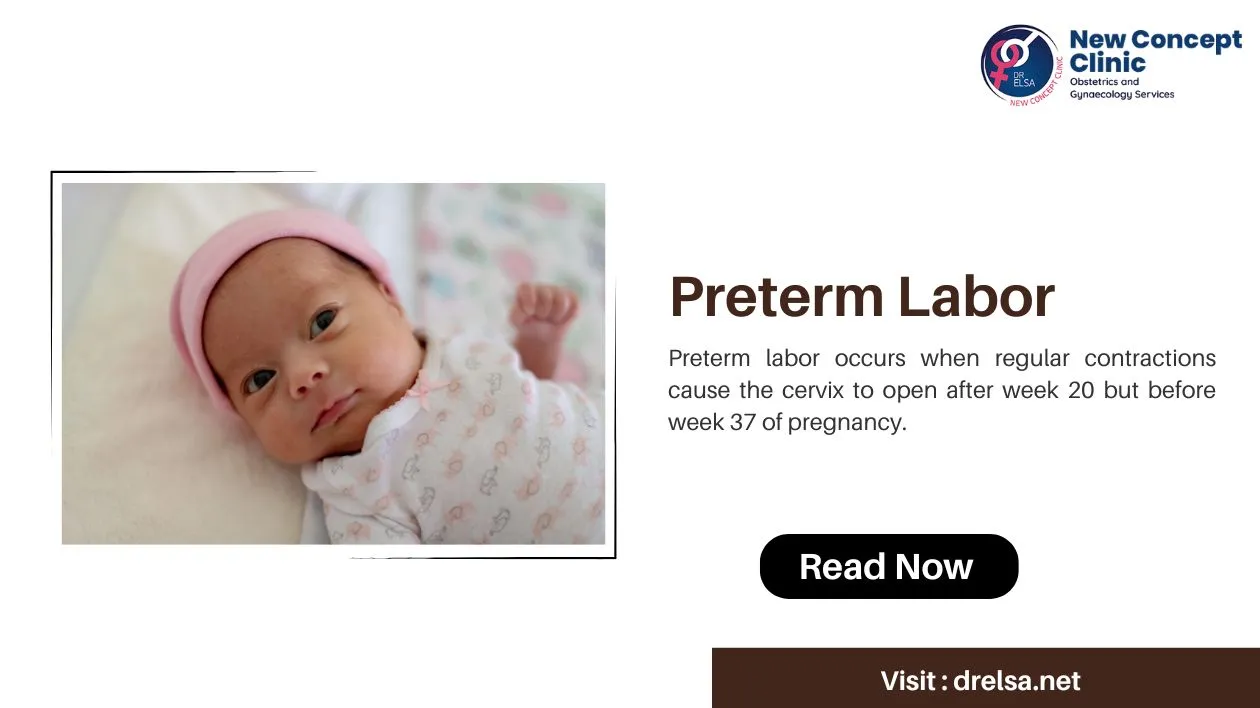

Preterm labor occurs when regular contractions cause the cervix to open after week 20 but before week 37 of pregnancy. Preterm labor can cause preterm birth. The earlier a premature birth occurs, the greater the health hazards to your kid. Many premature babies require particular care in the neonatal intensive care unit. Preemies can develop long-term mental and physical impairments. Preterm labor is frequently caused by unknown factors. Certain risk factors can boost the incidence of preterm labor, but it can also present in pregnant lady with no known risk factors.
Signs and symptoms of preterm labor include:
Consistent or regular symptoms of abdominal tightening (contractions)
Constant low, dull backache.
Feeling of pelvic or lower abdominal pressure.
Mild stomach cramps
Vaginal spotting or mild bleeding
Preterm rupture of membranes—in a flood or a continual trickle of fluid after the membrane around the fetus breaches or tears
A shift in the kind of vaginal discharge—watery, mucus-like, or bloody.
If you see any of these signs or symptoms, or if you are worried about how you are feeling, call your health care practitioner immediately. Do not be concerned about confusing fake labor for the genuine thing. Everyone will be relieved if it is a false alarm.
Preterm labor can affect any pregnancy. Many factors have been associated with an increased risk of preterm labor, are following :
Previous preterm labor or early birth, especially in the most recent pregnancy or in more than one previous pregnancy.
Cervix shortened
Issues with the uterus or placenta
Smoking smokes or using illegal drugs
Certain infections, particularly those involving the amniotic fluid and lower genital tract
Some chronic illnesses, such as high blood pressure, diabetes, autoimmune disease, and depression.
stressful life circumstances, such as the death of a loved one.
Excess amniotic fluid (polyhydramnios).
Vaginal hemorrhage during pregnancy
Fetal birth defects
A gap of less than 12 months or more than 59 months between pregnancies.
Age of mother, both young and old
Race and ethnicity: Black, Non-Hispanic.
Preterm labor complications include the delivery of a premature baby. This can result in a variety of health issues for your kid, including low birth weight, breathing difficulties, undeveloped organs, and eye abnormalities. Children delivered preterm are more likely to develop cerebral palsy, learning impairments, and behavioral issues.
You may not be able to prevent preterm labor, but you may take several steps to support a healthy, full-term pregnancy. For example:
Seek regular prenatal care. Prenatal checkups allow your doctor to monitor both your and your baby's health. Please describe any indications or symptoms that concern you. If you have a history of preterm labor or experience symptoms of preterm labor, you may need to see your doctor more frequently during pregnancy.
Eat a healthy diet. Healthy pregnancy outcomes are often linked to adequate eating. Furthermore, some studies suggest that a diet high in polyunsaturated fatty acids (PUFAs) reduces the risk of premature birth. Nuts, seeds, fish, and seed oils all contain polyunsaturated fat.
Avoid risky substances. If you smoke, quit. Consult your doctor about a smoking cessation program. Illicit drugs are also not allowed.
Consider pregnancy spacing. According to some study, pregnancies spaced fewer than six months apart or more than 59 months apart are associated with a higher risk of premature birth. Consider speaking with your healthcare professional about pregnancy spacing.
Be cautious when using assisted reproductive technology (ART).If you intend to use ART to become pregnant, consider how many embryos will be transferred. Multiple pregnancies increase the chance of premature labor.
Manage chronic conditions. Diabetes, high blood pressure, and obesity are all associated with an increased risk of premature delivery. Work with your doctor to manage any chronic diseases.
If your doctor believes that you are at a higher risk of preterm labor, he or she may urge that you take additional precautions.